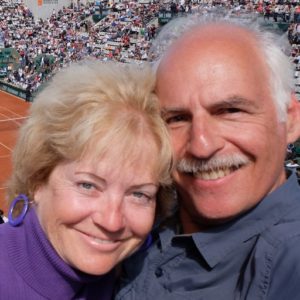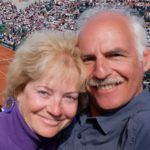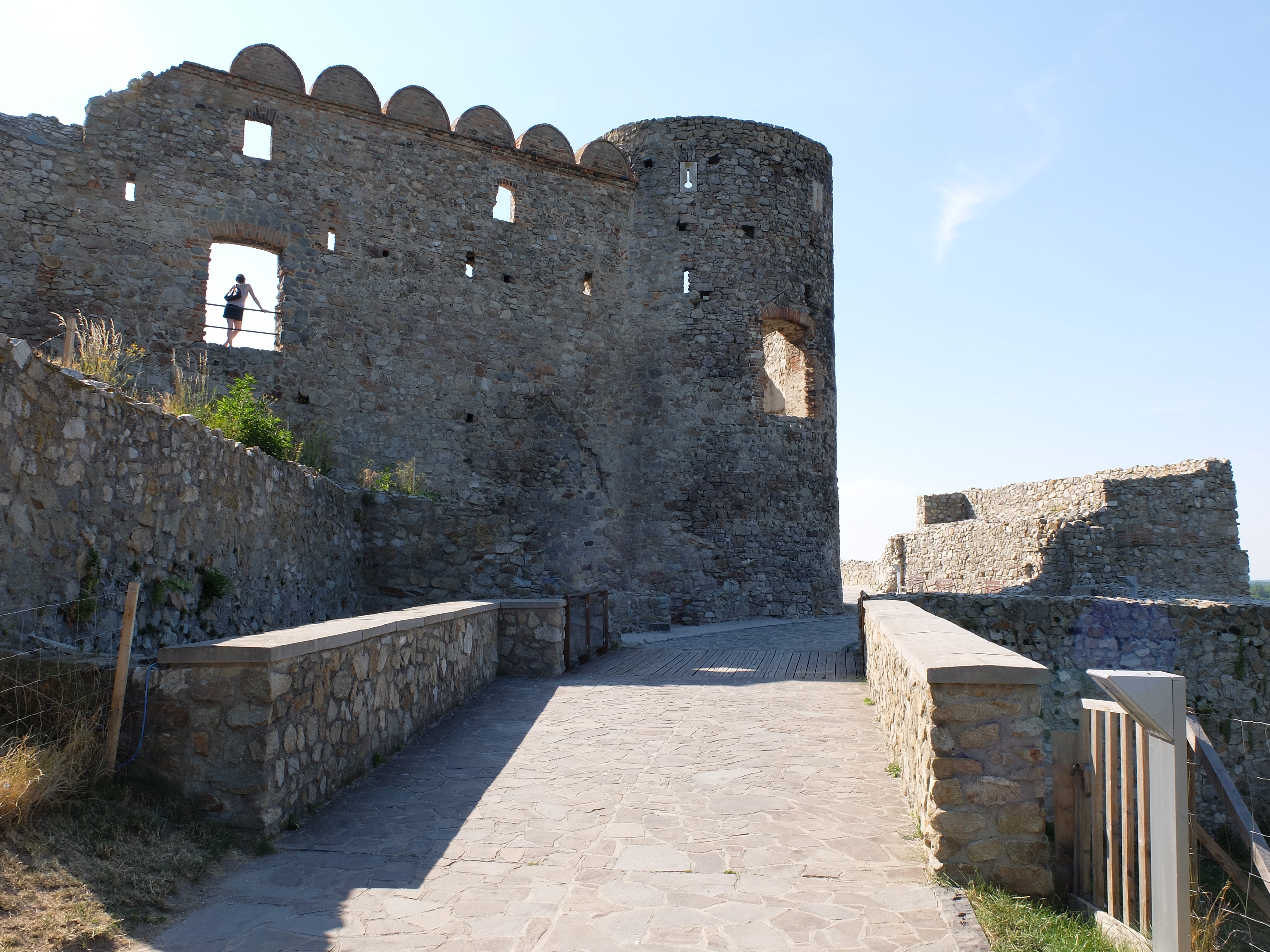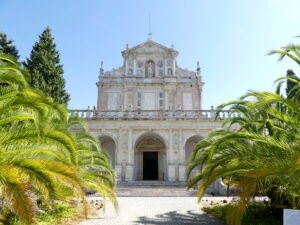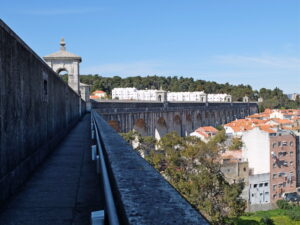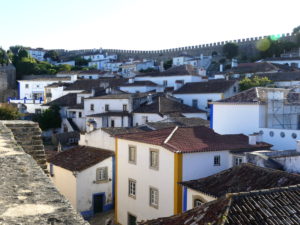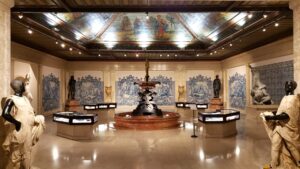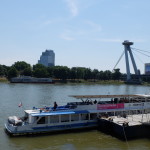
It’s all about the journey, not the destination.
We’ve all heard that line before, whether noted about the potential of travel or preached about life’s passage. Over the years, for us, travel journeys have usually been much less interesting than the destinations (oh, those long airplane trips to and from New Zealand and Australia).
Yet there have been many journeys that have rivalled the end-points, as in our elongated multi-part boat ride down the Mekong River through three countries.
Sometimes they were inseparable in their pleasures. Our journey to Antarctica nearly rivalled the unique landscape there. Among other things, we were stuck overnight in the Falkland Islands, where the locals took us into their homes to spend a rollicking evening. We swelled and fell in the turbulent Drake Passage, with some of our group seasick for three days, and some injured in the heaving. We lost an engine but avoided the fate of another ship nearby, which was sunk by an iceberg. All that experience made long-lasting memories and friends.
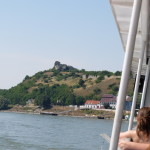
On a much smaller scale, a short boat trip up the Danube from Bratislava recently proved a lot more interesting than our destination. We were visiting Devin Castle, a ruin from the 14th century standing high atop the river, only about nine kilometers from the city. The trip was surprisingly languid, a one and a half hour ferry ride up river and then a half-hour ride back.
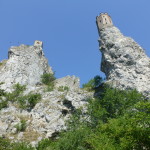
Go – the guidebooks and the brochures exhorted – for the interesting stony remnants of walls and rooms, for the exhibitions on its history, for the views over the Danube.
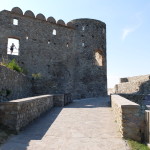
Not quite. To start, beneath the castle, it didn’t help the atmosphere much as we passed through a parking area busy with holidaying crowds and encircled by stalls hawking tourist souvenirs or fast food. After the gate and our climb up the steep rise, we found the most extensive part of the castle remains were blocked off due to restoration work improving its stability.
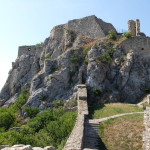
Where we could go, we saw an imposing triple arched wall, but that was pretty much all the ruins of interest. The exhibits that had been in the unreachable section were also closed. One building at the entrance to the grounds contained an unappealing display about pots and tools uncovered from Neolithic and Bronze Age dwellers atop the cliffs.
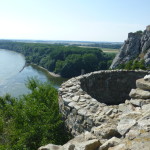
The views over the Danube and the hilly landscape were lovely, but hardly special in a land where you can find a hrad, or fortified hill castle, everywhere – along with landscape views aplenty. The lightly forested grounds around the castle were also quite pleasant – especially because we were facing afternoon temperatures in the high 30s Celsius, which made the exposed promontory of the castle ruins difficult to endure, let alone enjoy.
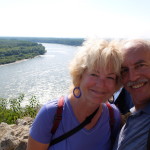
So we had to admire the bravado of the troupe of people who – dressed in what appeared to be heavy costuming – trouped, wrangled and contended out in the sun to demonstrate to the tourists different forms of medieval entertainments, from jousting to festive dancing to marching and shooting.
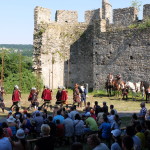
The demonstrations were accomplished and energetic enough, but to us the mock battles, displays of horsemanship and other folderol were all a bit silly, too similar to so many other shows of that sort . Not quite a living Game of Thrones. Our biggest thrill was at a stand nearby, shooting off a few arrows from a rope-strung bow and cross-bow…and hitting the target. Plus a tall, cold beer to ward off the heat.
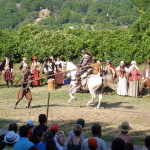
But the journey made up for it, for we shared a table with two very different travelers along the way – from two very disparate worlds.
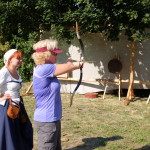
On the long outgoing trip, we talked with a 40-something Korean woman currently on sabbatical in Cambridge, England. She was somewhat reticent, but seemed pleased to find some companionship during the boat ride. She was a professor of political science, with a specialty in federation methods of government. She knew well about Germany and its slow success in annexing East Germany. So she spoke wistfully and knowledgeably of the near impossibility of the same happening to the two Koreas. Despite the kinships between the people, the two Koreas had diverged economically so much that it would now be prohibitively expensive to merge.
She seemed oddly two-sided: an adventurous woman happy to travel independently, but one who seemed to enjoy very few destinations she traveled to. Oddly for a professor, she seemed to hardly study the places she planned to visit. Bratislava, for example, was a tiresome place for her, especially with the heat – and we too understood the limitations of that city in just a few days. Yet, unwittingly, she had already committed to staying a week there. At least it was close to Vienna, so she could head there for a day or two, she said. All of this was a strain for her, however, as her nervous demeanor underscored. She didn’t earn a lot from her university work in Korea. Staying in Britain, even with some teaching, was difficult for her because it was so costly. Now here she was spending more on a less than pleasing stay.
Once we arrived at Devin, she was happy to take off on her own despite our invitation to join us. We saw her wandering slowly about the ruins holding an umbrella against the sun. Nor did she try to join us again on the return trip. The heat of the trip and of the castle had worn her out.
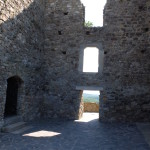
That cleared our table for the short return trip. The Korean’s replacements were quite different. They were an ebullient Polish couple about our age, from the south near Krakow. They had gone to Devin on the day they arrived in Bratislava because the next day they were to join up with a small Polish tour group on another one of its regular jaunts about Europe.
We talked first about our interest in visiting Poland, an aim they encouraged. After a bit more travel talk, suddenly the man started to drop names of songs and bands from American (and British) rock music of the 60s and 70s, as well as jazz and blues. We could barely keep up with his detailed and devoted knowledge. How did he become so interested, we wondered. He explained that in the repressive world of Communist Poland teenagers could find few ways to feel free. Playing Western music and emulating, as one could, the liberated style of the time at least helped him and his compatriots believe there could be a western-style hippie potential sometime within that otherwise suppressed society. These were not just songs for him and his friends, but notes of rebellion.
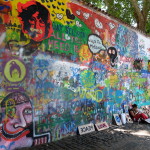
We had seen the same feelings expressed graphically in Prague on the John Lennon Wall. That’s a plastered churchyard wall near the Charles Bridge that has been scrawled on and painted over again and again ever since Lennon died, originally as an affirmation of what the music and freedom of the West meant to those in the East.
It occurred to us much later that in our boat ride to an ancient ruin we had traced the divergent journeys of two contemporary peoples: a downtrodden country that has been on its way to realize, if not its hippie potential, at least its human one; and another country that sadly looked less and less likely to reach its own.
(Also, for more pictures from Czech Republic, CLICK HERE to view the slideshow at the end of the Czech Republic itinerary page.)
